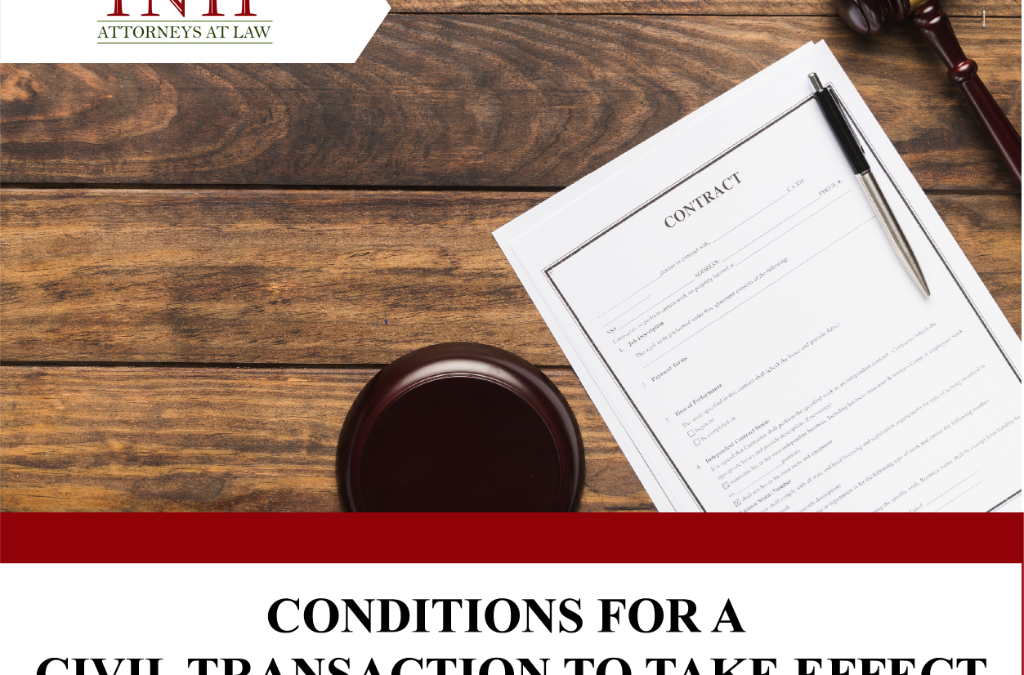Along with the development of social life, civil transactions have been on the rise, in fact, transactions are also increasingly diverse in types as well as subjects. However, due to various reasons, many transactions are declared invalid because they do not meet the conditions prescribed by the law, mainly due to ignorance of the law,… Here we will present the conditions for a civil transaction to take effect.
1. The concept of civil transactions
According to Article 116 of the Civil Code in 2015, a civil transaction is understood as a contract or a unilateral legal act that gives rise to, changes or terminates civil rights and obligations. Thus, basically, civil transactions will consist of two types: (i) contracts; (ii) unilateral legal acts in which contracts are considered a common form and are used extensively in social life.
2. Conditions for civil transactions to take effect
Conditions for civil transactions to take effect are specified in Article 117 of the Civil Code, which includes the following four conditions:
-
Conditions on subject capacity
Depending on specific civil transactions, the subject will have to have legal capacity, corresponding and appropriate behavioral capacity, such as transactions related to real estate that require the subject to have behavioral capacity, including from full 18 years old and not lose the ability to perceive and master behavior.
-
Conditions on the will of the parties
The parties when establishing civil transactions must be completely voluntary, this is expressed in the fact that there must be a unity between the will (inner desire) and the expression of the will (revealed outside the objective world), in case the parties are involved in the transaction due to deception, being coerced will not meet this.
-
The purpose and content of civil transactions do not violate the prohibitions of the law, are not contrary to social ethics
Basically, civil law recognizes and respects the agreement of the parties, but this agreement must not be contrary to the prohibitions of law and social ethics.
Prohibitions of the law are provisions of the law that do not allow the subject to perform certain acts. To determine whether a transaction violates the prohibition of the law, each party needs to rely on specific legal provisions. For example, a fixed-term marriage agreement is considered a violation of the law, or a transaction is established with the purpose of infringing on the personal and property rights of others, violating public and social order,… cannot be effective.
Social ethics are common norms of behavior in social life, recognized and respected by the community. Unlike the law, moral standards are not written into written laws that are coercive or imperative, but are carried out by people according to social consciousness and conscience and public opinion.
-
Conditions on the form of civil transactions
Other than the above three conditions, all civil transactions must be complied with. For this condition, the form of a civil transaction shall be considered only as a condition of the validity of a civil transaction in cases provided for by law. For example, in many cases, contracts for the transfer of land use rights, land use rights and assets attached to land, housing purchase and sale contracts to take effect are required to be notarized or authenticated in writing in accordance with the Provisions of the Land Law of 2013 and the Law on Housing in 2014.
3. What do individuals need to do when civil transactions are invalid?
In case of entering into or performing an invalid civil transaction, the parties should do the following to minimize the risks caused by this transaction:
- Review and find out the reasons leading to invalid transactions;
- Agree with the other party on whether to perform the contract or not to perform it (if possible);
- If the parties want to continue performing civil transactions, it is necessary to overcome and supplement the effective conditions that the parties have not previously met or violated;
- Determine the amount of damage (if any) as a basis for claiming damages against the party causing the damage or agree on smaller damage compensation.
Above is the article “For a civil transaction to take effect, what conditions should be met?”. We hope this article was useful to you.
Best regards,







